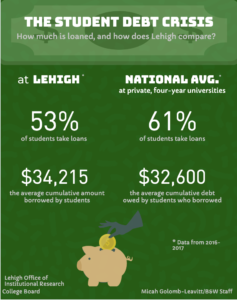
Nationwide tuition increases across colleges and universities, aided by the consequent accumulation of student loan debts, prompted Sen. Bernie Sanders to propose a legislation to cancel debt.
His proposal, The College For All Act, aims to eliminate tuition and fees at public four-year colleges and universities for students whose families make less than $125,000. It aims to make community college free of tuition and fees for everyone.
Sanders’ goal is to erase the $1.6 trillion currently owed in federal student loan debt.
“I think that student debt will certainly influence student votes in the primaries,” said Jack Graham, ‘22, the president of the Student Political Action Club. “I’d like to see student debt canceled. I have like $25,000 in student debt, and I’m only a sophomore.”
According to the Common Data Set, 50 percent of Lehigh students that graduated with a bachelor’s degree in 2018 took out student loans, which averaged $35,109.
Student loan deficit is increasing because the cost of higher education is rising far faster than the cost of living and salaries, when adjusted for inflation.
“I think it’s pretty clear that the student debt crisis is growing,” Graham said. “The question is: how can we fix it?”
Sen. Elizabeth Warren proposed a similar plan to Sanders’.
“Lehigh students: they’re not going to benefit from having their debt forgiven because Lehigh students tend to repay their debt,” Dearden said. “There is a small percentage of Lehigh students who renege or default on their debt.”
Dearden said students will be providing money for the program in the future, and as a result, they will be paying higher taxes.
Sanders’ plan would lower interest rates on student loans from 3.76 to 1.88 percent. This would have a more direct impact on Lehigh students because a reduction in student loan rates would save them money.
“Over the next decade, the federal government is projected to make over $70 billion in profit off of the student loan program,” Sanders’ proposal said.
Jennifer Mertz, the director of financial aid, said although the lower interest rate is beneficial, the government relies on and controls the interest rates.
Dearden said the issue is the market, which should determine interest rates.
“There are some parallels to the housing crisis of 2008, just that more people are being approved for more and more significant loans with less credit checks,” Graham said.
He said credit checks could be monitored more as another way to decrease student debt.
Mertz said students are borrowing more than they need to.
“Here in our office, we are fortunate to be able to say to families, ‘We don’t think this is a good financial fit for you because borrowing a hundred thousand dollars is not wise,'” she said. “We can not tell them that they can’t borrow $100,000.”
Mertz said there are misconceptions surrounding loans.
She said she borrowed loans and paid them back.
“In terms of student loan debt, I don’t think it’s always awful,” Mertz said. “I really do believe firmly that you’re investing in an education that lasts forever.”





Comment policy
Comments posted to The Brown and White website are reviewed by a moderator before being approved. Incendiary speech or harassing language, including comments targeted at individuals, may be deemed unacceptable and not published. Spam and other soliciting will also be declined.
The Brown and White also reserves the right to not publish entirely anonymous comments.